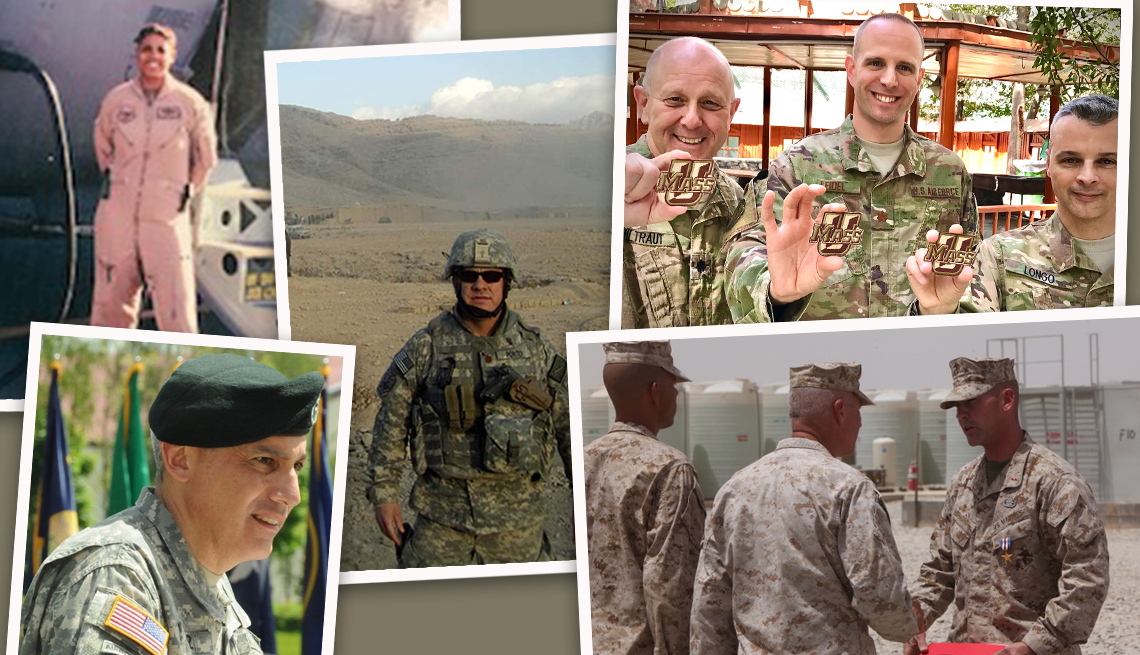
Afghan war veterans reflect on their service
- Select a language for the TTS:
- UK English Female
- UK English Male
- US English Female
- US English Male
- Australian Female
- Australian Male
- Language selected: (auto detect) - EN
Play all audios:

WHAT IS YOUR MOST VIVID MEMORY? I have lots of vivid memories. But being able to experience a different landscape and culture was a very positive experience. However, I think the most
impactful experience was having to say goodbye to fallen friends and comrades as we placed them on an airplane for the last trip home. WHAT IS SOMETHING YOU THINK ALL AFGHAN WAR VETERANS
MIGHT SHARE IN COMMON? It's difficult to put in words, but a commonality of understanding that you walked the same ground and experienced the same difficulties and dangers. After 30
years of serving my nation in many different capacities and places around the world, I still find service to the nation something that compels me and, I think, compels most people who
have served in the military, especially those who have served in dangerous places. ANDREA MCCLAM, 59, OF CHICAGO Andrea McClam served as the only female member of her crew. Courtesy Andrea
McClam As the only female on her crew, McClam served as loadmaster between 2003 and 2005, transporting personnel and cargo throughout Afghanistan, the Middle East and even Europe. Her
military career supported the U.S. efforts in Operation Desert Storm and the invasion of Panama. She retired from the Air Force in 2009, after 27 years as a senior master sergeant.
HOW DID AFGHANISTAN COMPARE WITH YOUR PREVIOUS DEPLOYMENTS? Afghanistan was really different. A lot of my operations were at night, requiring us to stay on the different bases we flew
into. My crew and I did everything together, and we were very close. We were like a little unit. I tell people my deployment prepared me for this pandemic because everybody around me
complains about being in the house. It’s like I’m deployed. HOW DID YOUR AGE AND EXPERIENCE PREPARE YOU FOR THE MISSION? Life experiences prepare you to be in a space where you’re not so
anxious about things. You just look at things in a different picture. As a young person, you’re real excited about things that you want to happen. But as a result, you tend to focus more on
your fear rather than the particular situation. We all have levels of fear. People ask me all the time, "Were you afraid?" I say, "Not outside the norm. For the most
part, I focused on my job and what I had to do to complete my missions." WHAT SHOULD AMERICANS KNOW ABOUT THE WAR? A lot of times, you talk to people who say they don’t even know
why we did this. But it is a history lesson. A little research on the history of our relationships with countries would help people understand why we go to the places that we go and do the
work that we do. We helped women gain more rights and spread democracy. But now, all that work that was done is all being taken away. WHAT IS YOUR MOST VIVID MEMORY? The environment
required us to constantly be on high alert in this survival mode mentality. Not doing anything to bring attention to yourself in the night. Stuff like you see in movies. You just got to do
what you got to do to stay safe. It was kind of funny because when I first came home, I was still kind of in that mode. I’d look under my car before I’d get in. Doing a lot of stuff that we
would do over there. And I was, like, "Oh, wow. I need to really transition to being a civilian again." WHAT WAS IT LIKE SERVING IN AFGHANISTAN AS A WOMAN? As Americans, we
just take so much for granted. When you go to a place like that, especially as a female, and you see how women aren’t spoken to, it's like they don’t exist. And then here in America,
we’re just free. We can do everything. I was the only female on my crew of six. I once got the opportunity to join an all-female crew, out of Qatar. They kind of snatched us from our
crews and put us together to fly this one mission. When we flew that mission, we had this certain pride about ourselves and were really excited that the leadership thought enough of us to
fly combat and that we could handle the mission. The few females that I talked to when I was deployed mainly talked about home, because a lot of those ladies were in their early 20s,
while I was in my late 40s. They kind of looked up to me, too, because I am a very spiritual person. So I would always find something to say to encourage them. I told them I have two young
sons at home. But I utilized email, Skype and wrote letters. The best thing about being deployed was getting mail.
